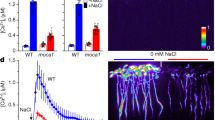Abstract.
Cells from several different plant species synthesised a polyphosphoinositide (PPI)-like lipid when osmo-stressed. Synthesis was maximal after about 10 min and was stimulated by a variety of osmolytes. Using NaCl, the strongest response centred around 200 mM. The lipid was shown to be the novel PPI isomer phosphatidyl-inositol 3,5-bisphosphate [PtdIns-(3,5)P2] by analytical thin-layer chromatography and conversion to PtdIns(3,4,5)P3 using recombinant phosphoinositide 4-OH kinase. The results indicate that PtdIns-(3,5)P2 plays a role in a general osmo-signalling pathway in plants. Its potential role is discussed.
Similar content being viewed by others
Author information
Authors and Affiliations
Additional information
Received: 6 November 1998 / Accepted: 14 December 1998
Rights and permissions
About this article
Cite this article
Meijer, H., Divecha, N., van den Ende, H. et al. Hyperosmotic stress induces rapid synthesis of phosphatidyl-D-inositol 3,5-bisphosphate in plant cells. Planta 208, 294–298 (1999). https://doi.org/10.1007/s004250050561
Issue Date:
DOI: https://doi.org/10.1007/s004250050561




